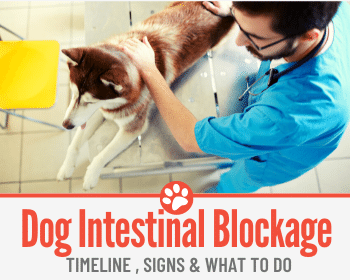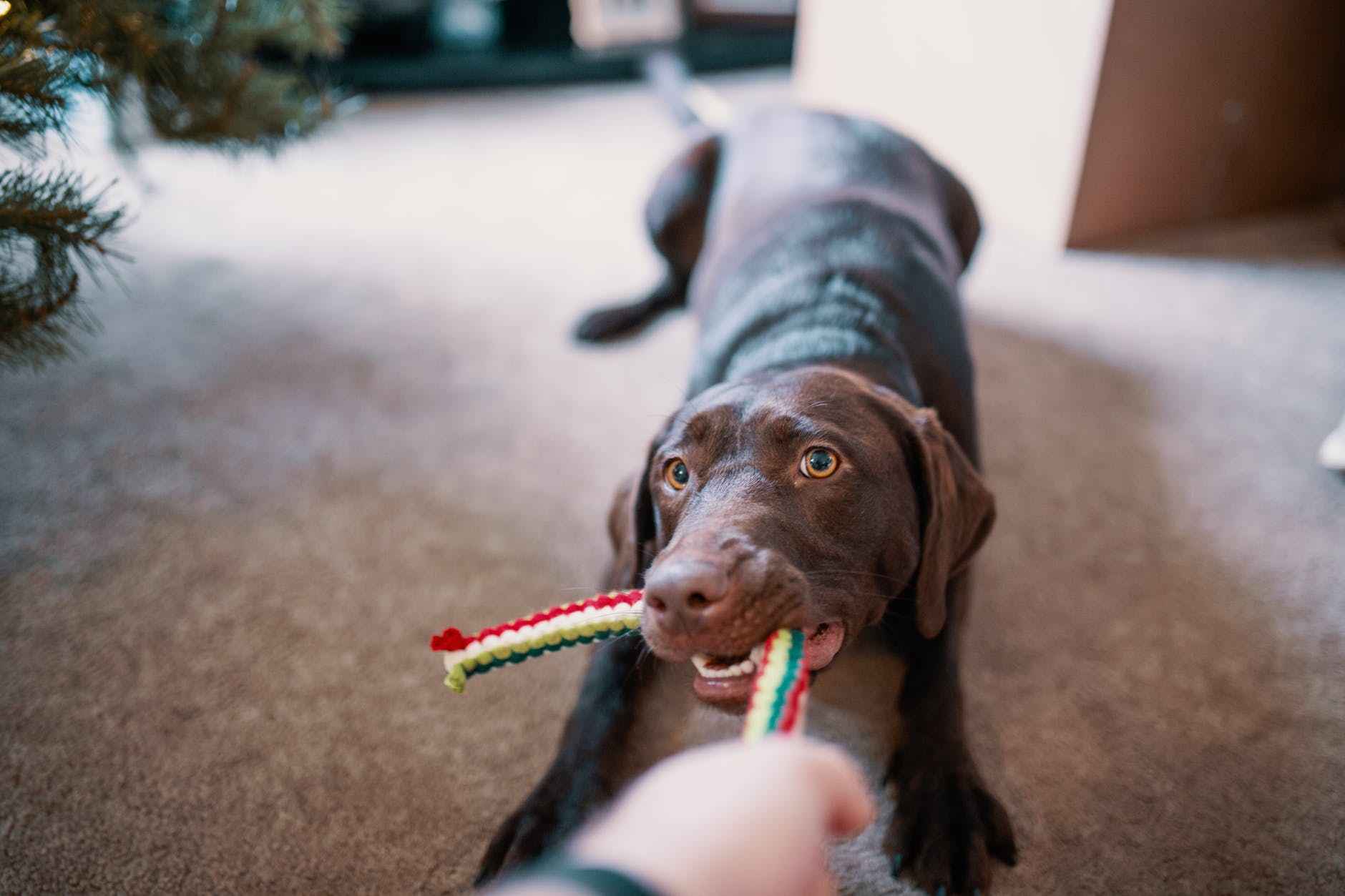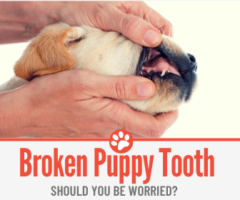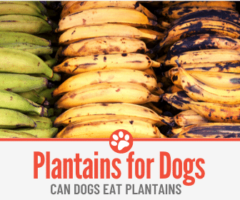 Dog intestinal blockage or bowel obstruction is a common problem with dogs. In this article, you will learn how a dog intestinal blockage progresses, what you should look out for, when you should worry and what you can do to help your dog pass the obstruction.
Dog intestinal blockage or bowel obstruction is a common problem with dogs. In this article, you will learn how a dog intestinal blockage progresses, what you should look out for, when you should worry and what you can do to help your dog pass the obstruction.
As a dog owner, the best treatment for intestinal blockage is prevention. You should try to make sure that your dog doesn’t have access to objects that can get stuck in their gut if they try to eat them.
It is difficult, to completely remove the danger because dogs, especially young ones simply like chewing everything.
Bowel Obstruction in Dogs.
Bowel obstruction or intestinal blockage in dogs happens when your dog’s intestine is completely or partially blocked so that food or fluids cannot flow through the small intestine.
There are two ways which intestinal obstruction or blockage occurs in dogs.
- The first is the obstruction of the movement of food from the stomach to the small intestine. It is called gastric outflow obstruction.
- The second type of blockage is an obstruction that prevents food and liquids from passing through the small intestines.
Dogs eating or swallowing objects that can potentially harm them or get stuck along the way is a common cause of an intestinal blockage.
Other less common causes of intestinal obstruction are tumors, inflammation of the intestines, gastric dilation volvulus (twisted stomachs) or intestinal volvulus – a condition where the intestine twists around itself. Some intestinal parasites also cause obstructions in the stomach.
If your dog’s bowel is blocked, it can reduce the supply of blood to the intestines leading to the death of some tissues. Some objects can even rupture the intestine and cause an infection. It is a serious condition that can lead to death in as little as 3 to 4 days.
Dog Intestinal Blockage Timeline
The time it takes for your dog to show symptoms of intestinal blockage according to the location of the blockage, the type of object ingested and whether it is a complete or partial blockage.
| Day | Symptoms | Duration | Do. |
| Day 1
(Your dog swallows a toy etc. or eats too much) |
· Loss of appetite
· Dog may start vomiting. · General uneasiness |
Typically starts a few hours after the dog ingests a foreign object. | Your veterinarian may recommend inducing vomiting with a 3% solution of hydrogen peroxide. Especially if the dog ingested the substance within the past 2 hours. |
| Day 2
Your dog has not passed the object out. |
· Loss of appetite
· Vomiting · Abdominal pain · Whining · Sits or lies down in a strange position (hunching) |
Varies.
It may start within hours of the dog eating the object or day later and lasts until the dog gets better. |
Make sure a supply of clean water is handy.
Look for any strange object in their feces. Do not attempt a bowel obstruction massage. Call your vet. |
| Day 3
|
If symptoms persist by day 3, it is time to see your vet. You may also notice:
· Constipation or serious difficulty passing feces · Lethargy · Fever (very dangerous sign) · Your dog could probably go into shock. |
See your vet immediately! You should get ready for a surgical operation to remove the object if it get serious.
Typically, it is best to see your veterinarian as soon as possible to make sure that the object isn’t toxic and to prevent necrosis (dead tissue) or even intestinal rupture. |
It can take up to 8 hours for symptoms to begin to show, although it varies widely and sometimes, symptoms may not be noticeable for several days. Especially if it is a partial blockage.
Symptoms of intestinal blockage in dogs.
Intestinal blockage starts when your dog eats something that cannot freely pass through the stomach or small intestine. Usually, the dog eats small objects that are found in the yard or pieces of clothing like socks or towels, which are not properly kept.
In one instance, two pairs of underwear, and two plastic squeakers were removed from the intestine of an 18-month-old Labrador Retriever a full week after he had swallowed plastic squeakers from his some of his new toys.
First, let’s look at the signs that should tell you that something is wrong.
If you notice that your dog is uneasy after a meal or you’re concerned that it might have swallowed something that could hurt him. Here are some of the signs of bowel obstruction in dogs that you should look out for.
Blockage in the Stomach.
If an item gets stuck in the stomach symptoms usually occur within a few hours after the object was ingested. The major symptoms are:
- Vomiting within a few hours after eating/swallowing the object.
- Abdominal pain
- Bloating of the stomach.
Objects that usually cause intestinal blockage in the stomach are smooth round objects like golf balls and marbles. Symptoms of an obstruction in the stomach tend to show up a few hours after the dog eats or ingests a foreign object like the balls I mentioned earlier.
Blockage in the Small Intestine.
Sometimes the object may get past the stomach into the small intestine and get stuck at the end of the small intestine. Common symptoms of intestinal blockage in the small intestine include:
- Vomiting after eating.
- Pain in the abdomen.
- Abdominal bloating.
- Lethargy and unwillingness to eat.
- Unusual drooling.
Other symptoms include hunching or whining, dehydration as it cannot hold water down, diarrhea and weakness.
Common objects that can cause blockage in the small intestines include strings, toys, stuffed animals, towels or other fabric and plastic material.

How Long can a Dog with a serious Bowel Obstruction survive?
A dog with intestinal blockage or bowel obstruction could die within 3 to 4 days if it is not quickly attended to. In the case of partial obstruction, the dog can survive for several weeks if it can keep drinking water.
How Long Does It Take a Dog to Digest Food?
It usually takes an average of 8 to 10 hours for dogs to digest a meal completely. However, each dog is unique, and some dog breeds can take as much as 12 hours to digest a meal while others may be able to digest their meal in as little as four hours.
The time it takes your dog to digest food, depends on the size of your dog, the dog breed, how young your dog is, the type of food and how much of exercise your dog gets or how active it is. Typically, larger breeds and younger dogs digest foods faster.
How to Help a Dog with a Bowel Obstruction
Despite your best efforts, dogs can still try to eat something they shouldn’t. The esophagus or gullet of your dog is large and allows your dog to swallow stuff that is impossible for humans to swallow. Since you can’t eliminate the risk of your dog eating something it shouldn’t. And you may not be able to spend the whole day supervising your dog to make sure it doesn’t chew up a plastic bag. It makes sense to learn about what you should do if Fido’s bowel is blocked.
If your dog begins to show signs of intestinal blockage or bowel obstruction, you should call your veterinary doctor at once. Your veterinarian will usually carry out a physical examination of your dog’s abdomen or perform an ultrasound or X-ray to confirm if your dog has an object lodged in the stomach or blocking the intestines.
Your doctor may try to induce vomiting with hydrogen peroxide if it is safe to do so. He or she may also give your dog intravenous fluids to correct dehydration and medications that ease the pain.
Sometimes your vet will try to use fluid therapy or enema to help your dog pass out the object. Your doctor will use this method if it is likely that the object will pass without surgery.
In serious cases, especially where the object is sharp and has been in the stomach for long or when the doctor cannot retrieve the object by other means, immediate surgery may be necessary.
If your veterinarian cannot determine what sort of object is causing the intestinal blockage, he or she may perform exploratory surgery to figure out what the obstruction is and remove it.
Some cases like gastric dilation volvulus (a bloated and twisted stomach) require immediate surgery. The surgery, medically known as a laparotomy, involves removing the object causing the blockage as well as any dead tissue in the intestines or stomach.
To prevent a recurrence of gastric dilation volvulus, your doctor may suture the stomach to the intestinal wall. Some deep-chested breeds like Great Danes undergo the procedure to prevent intestinal obstruction caused by the intestines folding.
How Much Does A Dog Intestinal Blockage Surgery Cost?
It varies widely. The average cost of intestinal blockage surgery in dogs is around $3000. But averages can be a bit deceptive. An intestinal blockage surgery might cost you as low as $800 or as much as $7000.
The cost depends a lot on how complex the surgery was, how long it took, where you’re having the surgery. For example, a bowel obstruction surgery in Manhattan, New York would probably cost much more than one in Berea, Kentucky. The veterinarian carrying out the operation also influences the cost. An operation carried out by a board-certified veterinarian may be more expensive than one that is done by a family vet.
Since it is a fairly common risk that your dog will need veterinary services, one of the best ways to prepare is to take out insurance on your dog as soon as you can. It can cut your expenses dramatically should your dog need any type of surgery.
After intestinal surgery, your dog may stay in the hospital for about 2 to 4 days before you can take him home.
Home Remedy for Dog Bowel Obstruction
It may not always be possible to get to the vet on time or at all. In that case here are some things you can try at home to help your dog with a blocked intestine.
There are several ways you can help a dog that is having a bowel obstruction. To be clear, however, once your dog begins to show signs of bowel obstruction or you see it gulping a piece of cloth, or any other object, your best bet is to quickly call the vet for advice.
- Induce vomiting: This should only be done if the dog has just ingested the object and the object is safe to bring back up again. You must talk with your veterinarian to know if it is safe to induce vomiting. If it is safe, your doctor may recommend using a 3% solution of hydrogen peroxide to induce vomiting.
It is not safe to try to make your dog vomit objects that are sharp or poisonous like lead-acid batteries. Always get professional advice before trying this out. Sometimes getting your dog to vomit may not work, and your vet will need to administer more effective medications or explore alternative treatment options.
- If your dog accidentally eats cooked bones, you can try feeding him with ½ to 1 slice of high-fiber bread or ½ cup of cooked brown rice. Hopefully, they will be able to protect his stomach by wrapping around the bone and easing the movement of the bone through his system.
- To prevent dehydration if you suspect that your dog is experiencing bowel obstruction, make sure to give your dog enough water. In some cases that are not too serious, it can help soften the food and aid in bowel movement.
If the object has made it into the intestine, you should immediately seek professional help as it can quickly go downhill from there.
Sometimes, olive oil can help smooth the insides of the intestine, making it easier for your dog to pass out the object that is stuck especially if it has made it to the colon.
Can a Dog Poop with an Obstruction?
If your dog’s bowel is completely blocked, it will not be able to defecate. If it is a partial blockage however, your dog may still be able to pass feces, but it may be very painful. If your dog is trying to pass out an object and it gets stuck in the rectum. You should never try to pull it out. You will cause very serious problems if you do.
It is very important to defer to a qualified veterinary doctor if you notice that your dog is having difficulties with bowel movement.
How to Prevent Intestinal Blockage in Dogs
- The first thing you should do is to make sure that you remove anything that could potentially injure your dog. Be sure to dispose of all plastic bags properly. Never feed your dog directly from a plastic bag.
- Dogs are notorious for loving to play with the trash. Making sure to keep your dog away from the trash can save you plenty of worries. If possible, keep your trash can locked up
- Also, you shouldn’t buy toys with small parts that they can easily get into their mouths. Your veterinarian can recommend toys that are safe for your dog.
- Overfeeding your dog can cause the stomach to bloat and twist, a medical condition known as gastric dilation volvulus. So, make sure your doggie eats just enough and not too much
- Do not feed your dog cooked bones because they can easily splinter compared to uncooked bones. It is a common cause of bowel obstruction in dogs.
- Properly training your dog with the “Leave it” and “Drop it” commands can help prevent your dog from trying out something potentially dangerous
Despite your best efforts, however, your dog may still be too adventurous. If that happens, you now know what you should do to help your dog and hopefully, your pet should be fine.






